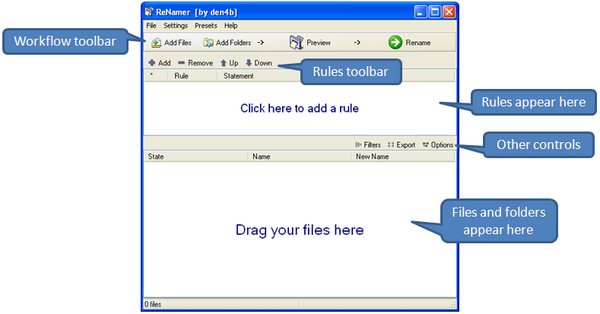ReNamer:Introduction: Difference between revisions
Jump to navigation
Jump to search
No edit summary |
(removed old help index) |
||
| Line 1: | Line 1: | ||
[[Image:ReNamer Main Outline.png|center|600px]] | [[Image:ReNamer Main Outline.png|center|600px]] | ||
Revision as of 22:29, 19 October 2009
ReNamer is a very powerful and flexible file renaming tool with the following features:
- The workflow toolbar makes renaming easy.
- ReNamer can rename files belonging to different folders (or even different computers) at a time.
You can also filter the contents of the folders before renaming. - ReNamer offers extensive set of rules for renaming. Each rule has controllable parameters.
- ReNamer can stack multiple rules in any sequence and apply in that order.
- ReNamer provides full preview (the affected file names can be highlighted).
- ReNamer allows you to try out the stack of rules on user-defined text
(this allows safe experimentation, without risking real files). - ReNamer can automatically handle name-conflicts arising from the renaming.
- You can save the stack of rules as a "preset" and re-use it later with a keyboard shortcut.
- ReNamer can rename folders also.
- ReNamer can rename Windows network (neighbourhood) files also.
- ReNamer can use RegEx (Regular Expressions) for the renaming.
- ReNamer supports Unicode filenames (e.g. Asian scripts, Cyrillic, French, Spanish, Arabic, Hebrew, etc).
- ReNamer allows scripting (Pascal Script) to create complex renaming logic
(many scripts are available at the Forum). - ReNamer can extract a large variety of meta tags from files and use them for the renaming.
(e.g. ID3v1, ID3v2, EXIF, OLE, AVI, MD5, SHA1, CRC32, etc) - ReNamer can export/import the renaming-related information.
- ReNamer can take automatic actions based on outcome of renaming operation
(e.g. clear off all successfully renamed files from the pane, but retain the problematic files) - ReNamer can be run in command line mode, with lots of parameters.
This allows you to select your files in explorer (or any other application) and do one-touch renaming.
